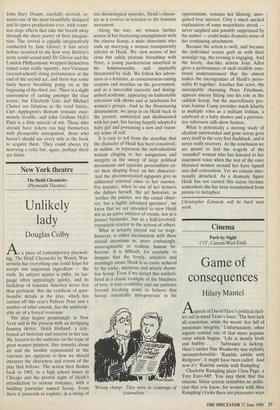New York theatre
The Heidi Chronicles (Plymouth Theatre)
Unlikely lady
Douglas Colby
As a piece of contemporary playwrit- ing, The Heidi Chronicles by Wendy Was- serstein has everything one could hope for except one important ingredient — the truth. Its subject matter is pithy, its lan- guage often appealingly quirky, and its backdrop of feminist America never less than pertinent. But the synthesis of ques- tionable details in the play, which has carried off this year's Pulitzer Prize and a number of other awards, has the unmistak- able air of a forced overview.
The play begins promisingly in New York and in the present with an intriguing framing device. Heidi Holland, a cele- brated art historian and essayist in her late 30s, lectures to the audience on the topic of great women painters. Her remarks about art and the models represented in the canvases are signposts to how we should interpret the characters and events of the play that follows. The action then flashes back to 1965, to a high school dance in Chicago and the pivotal night of Heidi's introduction to serious romance, with a budding journalist named Scoop. From there it proceeds to explore, in a string of ten chronological episodes, Heidi's charac- ter as it evolves in reaction to the feminist movement.
Along the way, we witness further scenes of her frustrating entanglement with the elusive Scoop, a male chauvinist who ends up marrying a woman transparently inferior to Heidi. We view scenes of her close but safely platonic friendship with Peter, a young paediatrician unsettled in his homosexuality and implicitly threatened by Aids. We follow her adven- tures as a feminist, at consciousness-raising sessions and marches on the government, and as a successful careerist and disting- uished academic, appearing on fashionable television talk shows and at luncheons for women's groups. And in the illuminating denouement, we peep in on Heidi back in the present, unmarried and disillusioned with her past, but having happily adopted a baby girl and possessing a new and vision- ary sense of self.
It is easy to tell from the storyline that the character of Heidi has been conceived, in outline, to represent the individualistic woman clinging to her uniqueness and integrity as the sweep of large political movements and separate personalities ex- ert their shaping force on her character. And the aforementioned signposts give us additional external clues to her essence. For instance, when in one of her lectures she defines herself, the art historian, as 'neither the painter, nor the casual obser- ver, but a highly informed spectator', we know that we are intended to view Heidi not as an active initiator of events, nor as a passive bystander, but as a half-involved, voyeuristic reactor to the actions of others. What is actually played out on stage, however, is either inconsistent with these overall intentions or, more confusingly, unrecognisable as realistic human be haviour. It is difficult, for example, to imagine that the lovely, sensitive and seemingly astute Heidi is so easily seduced by the cocky, unctuous and utterly charm- less Scoop. Even if we accept this unlikeli- hood as a classic example of the blindness of love, it tests credibility and our patience beyond breaking point to believe that Scoop, essentially unregenerate in his
`WrOng charge. They were in contempt of journalism.'
opportunism, remains her lifelong, unre- quited love interest. Only a much needed explanation of some masochistic streak never supplied and possibly suppressed by the author — could make dramatic sense of her continuing attachment.
Because the action is swift, and because the individual scenes grab us with their nostalgic tug, the evening is engaging. And the lovely, doe-like actress Joan Allen gives a performance of such credible emo- tional understatement that she almost makes the incongruities of Heidi's perso- nality fit together. Another fine actor, the inescapably charming Peter Friedmin, appears uneasy fitting into his role as the caddish Scoop, but the marvellously pro- tean Joanne Camp provides much hilarity in multiple roles as a militant lesbian, a celebrant at a baby shower and a provoca- tive television talk-show hostess.
What is potentially a moving study of idealism unrewarded and gone astray goes awry itself in the very first flashback, and it never really recovers. At the conclusion we are meant to feel the tragedy of the `stranded' woman who has listened to her innermost voice when the rest of the once liberated women around her have lapsed into dull convention. Yet we remain emo- tionally detached. As a dramatic figure Heidi has not earned this status because somewhere she has been transformed from person to metaphor.


















































 Previous page
Previous page